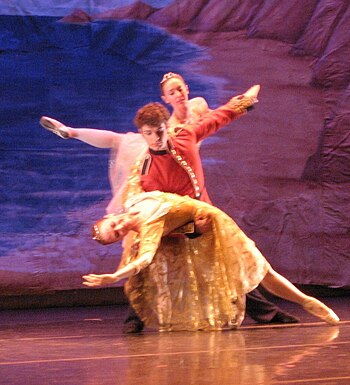 |
| Three ballet dancers (Photo credit: Wikipedia) |
Ballet dancers will complain of some foot injury at some stage in their training, and professional ballet will often be plagued with chronic foot injuries, ranging from mild ones that are nursed for years, to severe injuries that may be career ending.
The truth is that much common foot and ankle ‘injuries’ occur as a result of poor “intrinsic” foot muscle strength. The “intrinsic” foot muscles are tiny little muscles that start and end within the foot, that help control the position of a dancer’s arch, and are responsible for the control of her toes within the shoe en pointe. If these small muscles are not working effectively, larger muscles called the “extrinsic” foot muscles that originate further up the leg become overused, as they attempt to perform two roles. This often leads to conditions such as “Anterior Compartment Syndrome”, “Stress Fractures” of the shin bone (tibia), or ‘Medial Tibial Stress Syndrome”, commonly known as “Shin Splints”.
Weakness in the intrinsic foot muscles and overuse of the extrinsic muscles will also result in the toes ‘clawing’ both when rising and en pointe. This is the biggest cause behind the nasty blisters that are often seen in photos of professional ballet dancers; however, this does not have to be the case. Control of the intrinsic allows the middle joint of the toes to remain straight while fully pointing the rest of the foot. This does not affect the look of the line of the foot, but does make dancing much more enjoyable when free of pain!
In many other sports, orthotic devices may be worn in the footwear required that will help stabilize the arch and settle symptoms related to poor intrinsic muscle strength. Unfortunately, in ballet slippers, these orthotics cannot be worn (although many have attempted this!) so the dancer is often left to ‘live with’ symptoms, or have repeated extended breaks from dancing.
With correct strengthening combined with gentle stretching, however, many of these ‘chronic’ injuries settle very quickly. “The Perfect Pointe Book” is a comprehensive collection of many exercises designed to specifically strengthen the foot muscles needed in any ballet dancer. While initially designed to help girls strengthen their feet before going onto pointe, this book is essential reading for any dancer, especially if they have had, or currently have any foot injuries. The exercises have been developed after years of working closely with ballet dancers and seeing first-hand what is most effective in regaining control of these small muscles.
Often ballet teachers find the specifics of training the foot strength needed for pointe work difficult as it came naturally to them. However, for many people, the isolated strength needed in the feet must be specifically trained, especially nowadays, as many children who grow up in cities spend little time barefoot on different surfaces, which naturally trains the tiny intrinsic muscles of the feet. Understanding how these muscles should work when dancing is imperative in a long, injury free, career in dance.

No comments:
Post a Comment